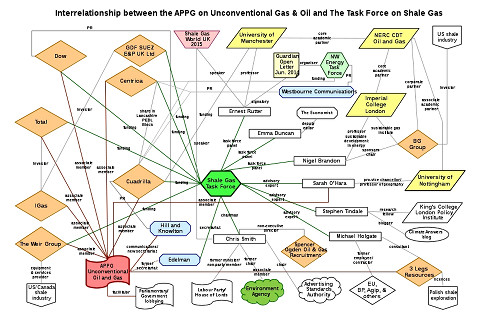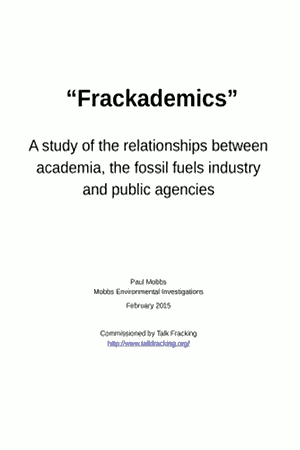
Paul Mobbs & MEIR:
‘Frackademics’
This study was commissioned by Talk Fracking to map the connections between the fossil fuels industry and academic – concentrating in particular on the relationships to unconventional fossil fuels companies and government agencies.
When examining the issue of “fracking”, and more generally the issue of unconventional gas and oil development and policy in Britain, it is very easy to concentrate on the specifics of the technology – and the impacts which that technology creates. In reality the policy and business of unconventional oil and gas in Britain is based upon far more than just 'technology'.
Policy is based upon a whole set of economic and technical assumptions; and over the last few years regulatory processes have been amended to reflect the requirements implicit in these assumptions.
‘Frackademics’ was conceived as a presentation, to be given to interested groups. You can download the slides from the presentation, and the accompanying presentation notes, below:
In fulfilling Talk Fracking's requirements to identify the links between ‘fracking’, fossil fuels and academia in Britain, six case studies were produced to illustrate different elements of the issue (click on the image to download an SVG image of that case study):

University funding and NERC's CDT for Oil and Gas;

Academic involvement in major shale gas studies;

The Mackay-Stone shale gas climate impacts study;

The Science Media Centre and the ‘seeding’ of articles;

Guardian ‘open letter’ from academics;
Each case study represents an intensifying 'sliding scale' of involvement between: (in case study 1) the role of academia as a centre for research and the development of knowledge; and (in case study 6) the objectives of the fossil industry to secure a particular view of the benefits of their technology via PR-based 'corporate strategy' companies.
The basis of each study is a ‘map’ showing the relationships between the principal players involved in the topic of the case study. Specifically the focus of the case study is not simply about the roles of individual 'players' in that process, but rather how group relationships set terms for research, discussion, and thus the nature of public debate.



